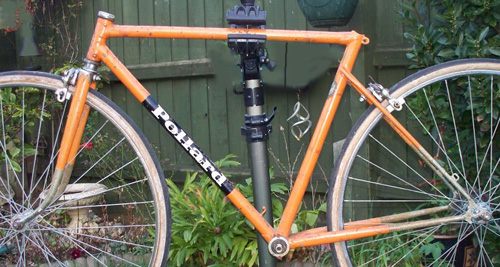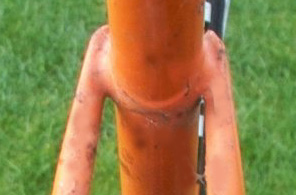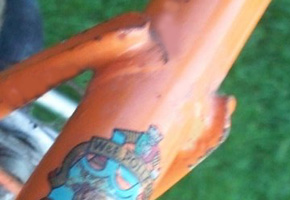Pollard, W & E
Posted: Saturday 06th June 2020
W & E Pollard cycles were established in Coventry in 1920 by Bill Pollard, who set up as a frame builder at the early age of 19 years after becoming dissatisfied with his employment at a Coventry motor factory. He was a member of the Midland Cycling and Athletics Club.
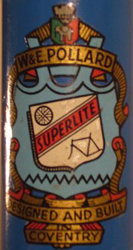
During World War II along with all other cycle-builders he was drafted to do contract war work but at the end of hostilities Bill started frame building again at Coundon, Coventry. In 1950 he moved the business to Stoney Stanton Road, staying there until the area was re-developed in 1968.Geoff, a friend of mine from King’s Lynn, tells me that it was through Bill’s son Eddie Pollard that he got into cycling, having gone to school with him in Coventry in the late forties. Bill had built Eddie his own machine called a Specialite (see image below) and it was this machine that convinced Geoff he must get out and start serious cycling with their local club. He recalled that it was a cross-frame. Geoff’s parents shortly moved to King’s Lynn, which is where we met in the local cycling club, King’s Lynn CC.
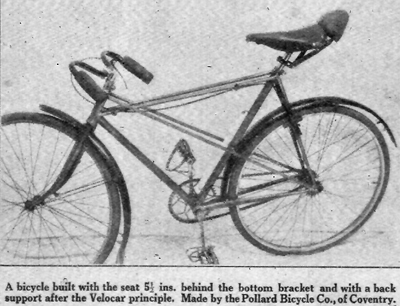
In 1945 Ken (John) Brown – brother of keen collector Peter Brown – was working and doing his training as an engineer in Leicester. One day he caught the bus to Coventry where Bill Pollard was making frames and building bikes in a large garden shed. He was measured for the frame and specified how he wanted it built. Three weeks later he made the bus journey again, collected his bike from Bill and rode it back to Leicester. Soon after this he returned to his home town of Grimsby where, as a member of the Grimsby Road Club, he had a successful racing career.
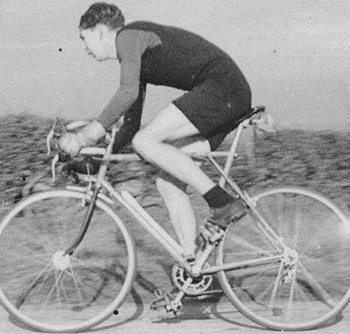
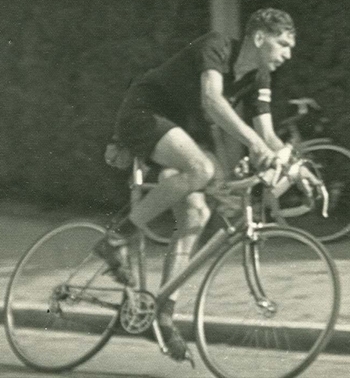
The frame built for Ken Brown was what is known as a ‘Hellenic’ style build where the seat stays cross the seat-tube below the seat lug and are then brazed to the top tube forward of the seat lug – see images below. (Hetchins also built ‘Hellenic’ frames). However Eddie Pollard insists this was known to them as the Cantilever model.
Bill’s son Eddie completed his National Service in 1953, having served in Korea and entered the business when he was demobbed from the army.
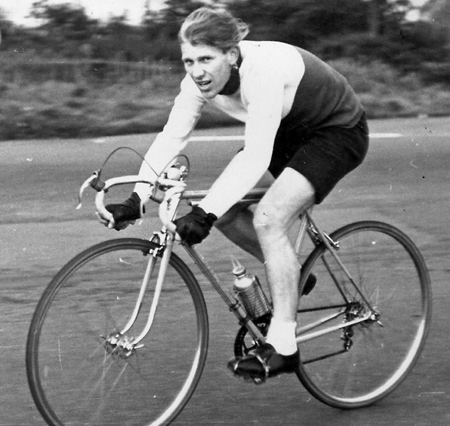
The Pollards soon bought another shop which was then managed by another keen cyclist, Alf Thrasher. Eddie was in both the Coventry Wheelers and then the Coventry Road Club and his contacts with club members contibuted towards the sale of the frames they were producing. Bill had started a sales ledger in 1920 and carried it on throughout to his retirement in 1990. By then the frame numbers had reached 1898, which seems to suggest that the numbering had been sequential. After his retirement, his daughters who both had experience of the business, took over running the shop in Newtown Road which had been established for some thirty years. There is still a shop – W & E Pollard & Co at 23 Newtown Road, Bedworth, Nuneaton CV12 8QB .
Some of the above information from: Cycling Weekly 31/5/1990
Bedworth Echo (date unknown but assumed 1990):
Bedworth’s last remaining bicycle shop has come to the end of the road after more than 30 years. Eddie Pollard pulled down the shutters at the family business in Newtown Road with mixed feelings. He said: “It is sad that it should go after all this time but you have got to retire sometime” … His father William Charles Pollard started the business in Bright Street Coventry in 1920 and had shops in Gulson Road, Primrose Hill Street and other areas of Coventry. He moved to Newtown Road, Bedworth, in 1968. “It was already a bike shop that had been run by a woman named Hilda Payne” said Mr Pollard. “I moved here and we carried on making frames until about 15 years ago. I gradually took over but my father still used to come along in the afternoons and he lived until he was 90.” Eddie Pollard retired to Majorca and his daughter Susan and son-in-law Michael ran the shop for 10 years. … I came back to sell up the business said Mr Pollard who is 68 and still cycles.
Eddie Pollard’s recollections in his own words of the Pollard Cycle Co. As told to Roger Langworth
The cycle business was started by my father, William Charles Pollard, after the big factory lock-out at the end of the First World War (he was a turner by trade). He opened his first shop in Brighton Street, Coventry, near to the New England Enamelling Co. It was from watching the workers in the Siddeley Deasey factory, later to become Armstrong Siddeley, making the fuselage for the R.E.8 aeroplane by latticing tubular steel into lugs and brazing the joints, that he got the idea of making bike frames.
My father used to ride from Coventry to the Reynolds Tube factory in Birmingham and buy H.M. Steel tubes (later 531) and carry them back in the saddle bag of his bike.
He started building frames for local cyclists and later on, tandems (no tandems were built after the second world war). He had premises in Edwich Road, Gulsan Road, and 23 Primrose Hill Street. He rode with the Demon Cycle Club, Wood End CC (Birmingham), and Midland Cycle and AC, with a lot of second places and hard luck tales. He had to return to factory work at the start of the Second World War turning parts for aircraft at the Daimler Car Co. in Folsehill, which was bombed several times. While he was there he also turned out parts in his own back garden shed at 86 Southwark Road, Coventry. After the war my mother went to a property auction, bought a shop at 96 Everharde Crescent for £1375, and started the cycle business again.
My parents then sold up and bought a guest house at Westgate on Sea near Margate. My father didn’t like the hotel trade so in 1949 they returned to Coventry where he walked into a shop and talked the owner into selling it. So he started again. I think he paid £1500 for the lease. The shop was called the Selium Cycle Co. run by Mr. Len Shatershaft, who also sold magic goods and was the president of the Magic Circle. I (Edward William Pollard) was then 17 years old.. In our first week we took £12 but it did get better. We built a large workshop at the back of the shop and built lightweight frames again. My father bought machinery and made parts for aircraft brakes.
After joining the Coventry Wheelers CC and having a little success as a junior, I turned 18 and got my call up papers to do my two years national service in the army where I served in Korea in the Duke of Wellington Regiment. I landed in Pusan on the day of my 19th birthday (21 June 1953). We were sent north to the 38th Parallel. The first place was called Yong Dong. It was a quiet place on the front line, although I heard my first bullet hit the ground in front of me. We defended various hlls along the ridges of the San Mechon Valley, ending in a big battle at the Hook in July 53. During my time in Korea I was on a guard of honour for General A.R.West and President Eisenhower. We waited for twp hours on the airfield at Seoul, after which the Americans issued us all with gloves.
I then went north with a M.A.S.H unit situated in a Olympic-sized swimming pool which I was told had never been used. I had two weeks R and R in Tokyo and one week in Inahon. I left Korea two weeks before the end of the war. My cousin Alan Milward arrived there two weeks before the end. My daughter used to say, “ You were in the Crimean war weren’t you dad?”
I was the only one in the family to go to war since my Uncle Charlie who fought in the Boer war. He was my Grandfather’s youngest brother. My grandfather’s elder brother, after whom I was named, lived in Borth, North Wales, and was secretary to Lord Leverhulme of Lever Bros in Port Sunlight.
I returned home via Mombassa, Southern Florida, and was demobbed in Halifax, soon starting work again in the family business. Eighteen months later we bought another shop at 96, Binsley Road, Coventry and engaged Alfred Thrasher, another cyclist, to run it.
In 1968 the council demolished Stoney Stanton road. Three years before we had bought another shop at 23 Newton Road, Bedworth, so we continued production from there.
My father died aged 90, my mother at 87 and I retired in 1985 when my daughter and son-in-law ran the business. But the cycle trade ran into difficult times, ruined by fashion and horrible heavy mountain bikes brought in from the Far East.
During the period we made about 2000 frames mostly in Reynolds 531 and better quality tubing. 82 years Hard work!
June 2009
Martin Biggs has rescued another Pollard, it is a 19½” frame from centre of cottered crank to centre of seat pinch bolt and 22¼” along the top tube with a 41″ wheelbase. From centre of bottom bracket to rear most point of rear-wheel dropout slot is aprox 18¼”. It feels nice and light so guessing it is 531DB tubing but no stickers although a 27.2 seat post seems to confirm this. The stem is 22.2 mm. The rear seat stays are ‘shot-in’ low on the seat tube, but not ‘Hellenic’ as seen above.
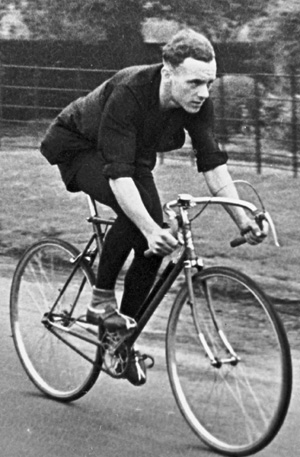
The person who I got it off had it his garage since the 1960’s hence the poorish state of the paintwork. The man he had it off had it from new and he remembers this owner going off to tour europe on it post war. He thinks that this was 1949/50-ish. So it could be probably 3 or 4 years either side. It came with 26” Conloy Constrictor rims on Harden hubs which certainly makes it early 50’s or before.
Pollard were based in coventry but later had a shop in Bedworth nr Nuneaton. they were still around till the early 80’s but sadly gone now. There is a frame number on the bottom bracket 7008. It was used by Vic Clark, British National Hill Climb Champion in the late 40’s. Roger Langworth adds: It has been confirmed by Eddie Pollard that the frame in question was ridden at three British National Hill Climb championships by Vic Clark – winner in 1946,1947,1948.(October 2011)
Roger Langworth was able to contact Vic Clark later, he still rides at the age of 92. He recognized the one I bought from Martin (shown above 19½”) and told me that Pollards built 2 frames for him. One of which he still has. The frames were identical and built to Vic’s specification. One was set up for fixed-wheel and the other for gears. He cannot remember which was which. However the one that I bought he broke the forks and so they were replaced with oval to round section. I enclose a photo of Vic in his prime on the bike.
More background. Vic won the British National Hill Climb Championship 4 times 1940- 1946,47,48.(records only go back to 1944) He was second to Bob Maitland in 1945, he was the first person to win it 3 successive years and his record stood until 1983.
Albert Cox was a racing member of Birmingham Crescent Wheelers, now defunct. He tells us that he also had a Pollard ‘Specialite’ frame built for him circa 1946 by Bill Pollard which he collected, on completion, from his Coventry shop and that he too went by bus to take delivery, much like Ken Brown.
Bill built the frame as a road/track machine which has a wheelbase of 39¾”. At that time chromium plating was not allowed for vehicles, including bicycles (and cars etc.), and any such surfaces were enamelled in gloss black. The Dunlop High Pressure rims and other accessories traditionally chrome were thus black so Bill had them all stripped and then nickel plated before chroming so that the finished bike was ‘as pre-war’. Also nickelled then chromed were half the forks, plus rear chain and seat stays, ‘chromed ends’ as they were known. Bill must have had contacts to get this done when plating was verboten.
The frame has a number 5031 stamped on the seat lug which is ‘close’ to the 531 tubing of which Reynolds tubing the frame is constructed. 5031, therefore may, or may not be the frame number but Albert can find no other indented identification. The Pollard metal badge, sadly, long disappeared. He raced the machine with 26 inch wooden sprints and various and appropriate grades of Dunlop Tubular tyres over the years on road and track. The original complete cost of the Pollard machine was £27–about 7 weeks wages for Albert at the time.
He also toured YHA fashion (including to Paris and Eire) with 27inch HP wheels and Airlite hubs. Later Albert embellished the bike with a Chater Lea chainset and inch-pitch chain equipment. Cyclo gears were used as an experiment but he rode mainly ‘fixed’ whether racing or touring. A lot of his riding was on 74”, unless track riding with a higher gear, but in the winter he dropped to 66” to keep warm by twiddling.
When touring abroad £30 (or later £50) in Sterling was the maximum anyone could take out of the country for pleasure. This cash amount was certified on the back page of one’s passport and checked rigorously at port exits.
Albert continued in the sport whilst conscripted in the RAF but felt that it ‘was not the same’. He later married and carried his sons, toddlers in turn, on the back of the Pollard and when they went as a family for 23 years to Melbourne he regularly cycled along the beach cyclepaths etc. The bike was renovated there around 1984 by the great Australian professional sprinter and friend /rival of Reg Harris, Sid Patterson, at his shop in East Bentleigh. Now back in UK it is mounted on Albert’s Turbo…the only place he can ‘ride’ being partially disabled.
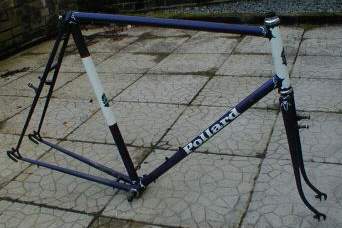
Albert has another story …like when he won another hand-built ‘to his own spec’ 531 track frame in a
sixpenny raffle [c1949] of the Banbury Star CC. This beautiful frame was crafted by ‘Lomax’ of Oxford…but that’s another tale.
Posted: Saturday 06th June 2020
This article appears in the following categories.
Upcoming Events
Whether you are looking for a gentle social meet up, or a 100-mile ride browse the community’s upcoming events and plan your next weekend outing.

